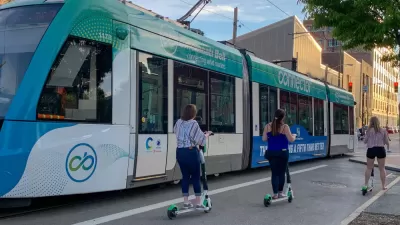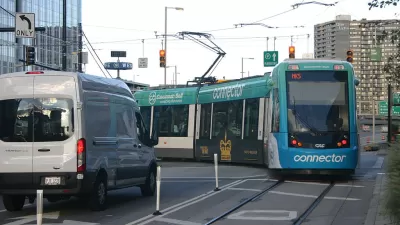After narrowly escaping attempts to kill the project, the Cincinnati Streetcar is now faced with questions about how to fund and expand the system.
According to Sharon Coolridge, "Cincinnati City Council on Wednesday asked the city's administration to study expanding the streetcar to Uptown."
"The study will look at where future funding could come from and is not expected to cost taxpayers additional money, beyond city staff time," adds Coolridge.
The study moved forward on a 5-4 vote and despite a "lengthy argument" and notable opposition from Cincinnati Mayor John Cranley. Mayor Cranley called the decision to study the second phase irresponsible. Coolridge quotes the mayor directly asking a rhetorical question to explain his opposition: "Shouldn't the focus be on making the first phase a success?"
For those keeping track at home, Coolridge explains how the Uptown extension, as proposed for Phase II of the streetcar project, was a part of the original plan for the system until Ohio Governor John Kasich pulled all $52 million in state funding for the project in 2011. Local officials moved forward with Phase I, which runs through Downtown and Over-the-Rhine. Funding also figures into the projects recent controversies, and Mayor Cranley's concerns, because the city has yet to resolve a $600,000 deficit for operating Phase I of the system.
Coolridge also notes that the Uptown extension has already been studied: "In 2009, consultants completed a feasibility study on the Uptown route, and streetcar project leaders spent another $201,000 on two Uptown studies last year."
FULL STORY: Council OKs Uptown streetcar study

Planetizen Federal Action Tracker
A weekly monitor of how Trump’s orders and actions are impacting planners and planning in America.

Maui's Vacation Rental Debate Turns Ugly
Verbal attacks, misinformation campaigns and fistfights plague a high-stakes debate to convert thousands of vacation rentals into long-term housing.

San Francisco Suspends Traffic Calming Amidst Record Deaths
Citing “a challenging fiscal landscape,” the city will cease the program on the heels of 42 traffic deaths, including 24 pedestrians.

Amtrak Rolls Out New Orleans to Alabama “Mardi Gras” Train
The new service will operate morning and evening departures between Mobile and New Orleans.

The Subversive Car-Free Guide to Trump's Great American Road Trip
Car-free ways to access Chicagoland’s best tourist attractions.

San Antonio and Austin are Fusing Into one Massive Megaregion
The region spanning the two central Texas cities is growing fast, posing challenges for local infrastructure and water supplies.
Urban Design for Planners 1: Software Tools
This six-course series explores essential urban design concepts using open source software and equips planners with the tools they need to participate fully in the urban design process.
Planning for Universal Design
Learn the tools for implementing Universal Design in planning regulations.
Heyer Gruel & Associates PA
JM Goldson LLC
Custer County Colorado
City of Camden Redevelopment Agency
City of Astoria
Transportation Research & Education Center (TREC) at Portland State University
Jefferson Parish Government
Camden Redevelopment Agency
City of Claremont




























